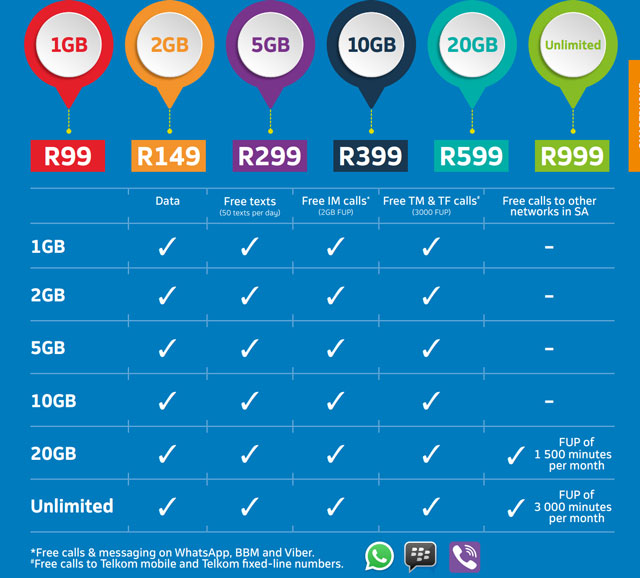
Twenty gigabytes of mobile 4G/LTE data a month, free on-network calls, 1 500 minutes of free calls to other networks, zero-rated WhatsApp and Viber, free SMSes, and free and unlimited Wi-Fi access at 6 000 hotspots. All this for R599/month? Not possible?
This is exactly what Telkom has just done, effectively detonating a pricing bomb on its bigger rivals in the mobile industry.
The company on Thursday evening took the wraps off “FreeMe”, a set of very aggressively priced mobile packages for both contract and prepaid users that looks set to leave Vodacom, MTN and Cell C scrambling to respond. They will be available for purchase from Monday, 25 July.
Telkom’s CEO for consumer and small business, Attila Vitai said: “FreeMe flies in the face of years of mobile industry tradition, where customers had to navigate confusing contracts, seemingly endless Ts&Cs, high peak rates and pricey extras, by prioritising simplicity, ease of use and value.
“Telkom FreeMe offers our customers smartphone plans that liberate them from everything they’ve ever hated about their network. Data has become the central requirement for most smartphone users, so that is what we have prioritised,” he said.
The packages start at R99/month and all include a data allocation (from 1GB for R99/month up to unlimited data for R999/month). But they also all include 50 free SMSes a day along with zero-rated BlackBerry Messenger, WhatsApp and Viber, meaning users can send messaging or make Internet calls without eating into their data allocation at all. In essence, the company has launched free Internet calling on its mobile network. Zero-rated Skype and FaceTime, where integration is taking longer, will follow later, said Vitai in an interview with TechCentral in advance of a Thursday evening launch event.
All the new plans include free calls to Telkom mobile and fixed destinations (up to 3 000 minutes a month), and on the 20GB and unlimited data options there are also 1 500 and 3 000 bundled minutes respectively to call any network in South Africa. The few users who exceed these (very generous) limits will pay 69c/minute for calls on per-second billing. Out-of-bundle data costs 29c/MB.
The table below provides more detail about the FreeMe plans, which are available to prepaid users on a 30-day rolling window, or on a month-to-month contract basis for a Sim-only option. Those wanting to bundle a handset with their contract can elect to pay for it over an agreed period of time, locking them in until it’s fully paid off.

Vitai said Telkom is confident the new plans will shake up South Africa’s telecommunications industry.
The company has been able to launch the offers after “re-farming” much of its allocation of radio frequency spectrum in the 1,8GHz band for 4G/LTE. Until recently, it had been used exclusively for legacy 2G services.
Though Telkom won’t switch off 2G entirely – it still has several hundred thousand users reliant on it – it has made it clear that its focus has shifted markedly to 4G.
It has already re-farmed 5MHz at 1,8GHz for 4G, with another 5MHz channel to follow. That will leave 2,5MHz to serve its legacy 2G base, which it said is sufficient. It said the 1,8GHz band had become an underutilised and therefore expensive asset to maintain.
Telkom already has a vast chunk of spectrum at 2,3GHz, but this, Vitai said, is better suited for fixed-wireless LTE applications. The 1,8GHz band, on the other hand, is better suited for use by smartphones. Though some newer smartphones can access Telkom’s 2,3GHz LTE network, the operator’s intention is to build a technical solution that prevents this, reserving the higher frequency exclusively for fixed-wireless access in homes and businesses.
Importantly, data on the new FreeMe plans is also available when users roam off Telkom’s network and onto roaming partner MTN’s infrastructure. However, the roaming agreement between the parties is for 2G and 3G only, not for 4G/LTE.
But in written response to a question about this, Telkom played down the fact that it doesn’t roam on MTN’s 4G network.
“Telkom endeavours to keep the vast majority of data demand on the Telkom radio access network and therefore the strategy is to deploy Telkom coverage and capacity to cater for areas which require high data connectivity requirements,” it said.
“The serving radio technology is also specifically planned for different market segments – for example, wireless broadband customers are best served by LTE … in the 2,3GHz band. The nature of roaming agreements doesn’t allow this type of granularity when planning for customer demand.” — © 2016 NewsCentral Media




